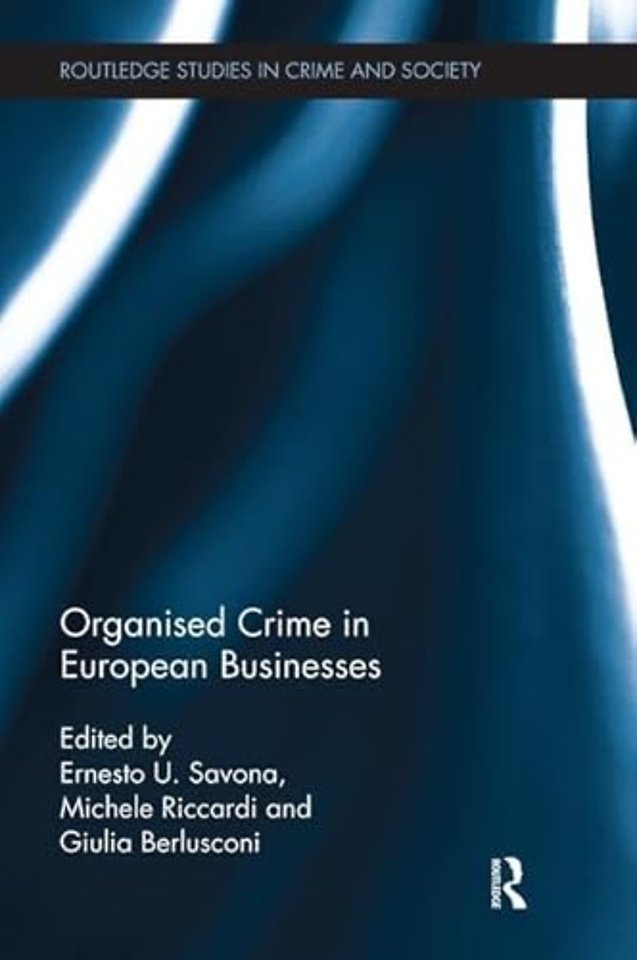Organised Crime in European Businesses
Ingenaaid Engels 2018 9781138499478Samenvatting
The infiltration of organised crime in the legitimate economy has emerged as a transnational phenomenon. This book constitutes an unprecedented study of the involvement of criminal groups in the legitimate economy and their infiltration in legal businesses, and is the first to bridge the research gap between money laundering and organised crime. It analyses the main drivers of this process, explaining why, how and where infiltration happens.
Building on empirical evidence from the Netherlands, Slovenia, Spain, Sweden, the UK, Ireland, Italy, France and Finland, Organised Crime in European Businesses is divided into four parts. Part I explores the infiltration of legitimate businesses to conceal and facilitate illicit trafficking. Part II examines the infiltration of legitimate businesses to develop fraud schemes. Part III focuses on the infiltration of legitimate businesses to control the territory and influence policy makers. Part IV concludes by considering the research and policy implications in light of these findings.
Bringing together leading experts and detailed case studies, this book considers the infiltration of organised crime in legitimate business around Europe. It is an ideal resource for students and academics in the fields of criminology, economics and sociology, as well as private sector practitioners, public officials and policy makers.
Specificaties
Lezersrecensies
Inhoudsopgave
1. Organised criminals and the legal economy (Giulia Berlusconi)
2. Measuring organised crime infiltration in legal businesses (Michele Riccardi and Giulia Berlusconi)
Part I: Infiltrating legitimate businesses to conceal and facilitate illicit trafficking
3. Transportation companies to hide transit crimes. Organised crime infiltration in the Netherlands (Joras Ferwerda and Brigitte Unger)
4. The sex market, bars and nightclubs. Criminal infiltration in Slovenia (Bostjan Slak, Maja Modic, Katja Eman and Branko Azman)
5. From drug trafficking to wholesale trade business. Organised crime infiltration in Spain (Jesus Palomo, Jeronimo Marquez and Pilar Laguna)
Part II: Infiltrating legitimate businesses to develop fraud schemes
6. Social welfare fraud and criminal infiltration in Sweden (Johanna Skinnari, Lars Korsell and Helena Roennblom)
7. Crash-for-cash and VAT carousels. Organised crime infiltration in the United Kingdom (David Wall, Yulia Chistyakova and Stefano Bonino)
Part III: Infiltrating legitimate businesses to control the territory and influence policy makers
8. Mafia infiltration in legitimate companies in Italy. From traditional sectors to emerging businesses (Michele Riccardi, Cristina Soriani and Valentina Giampietri)
9. Grand banditisme traditionnel and foreign groups. Organised crime infiltration in France (Michele Riccardi and Diana Camerini)
10. From bikers to entrepreneurs. Motorcycle gangs infiltration in Finland (Sarianna Petrell and Jarmo Houtsonen)
Part IV: Research and policy implications
11. The impact of organised crime infiltration on the European legitimate economy (John Walker)
12. From the analysis of criminal infiltration to the assessment of its risk (Lorella Garofalo)
Conclusions (Ernesto U. Savona)
Anderen die dit boek kochten, kochten ook
Rubrieken
- advisering
- algemeen management
- coaching en trainen
- communicatie en media
- economie
- financieel management
- inkoop en logistiek
- internet en social media
- it-management / ict
- juridisch
- leiderschap
- marketing
- mens en maatschappij
- non-profit
- ondernemen
- organisatiekunde
- personal finance
- personeelsmanagement
- persoonlijke effectiviteit
- projectmanagement
- psychologie
- reclame en verkoop
- strategisch management
- verandermanagement
- werk en loopbaan







